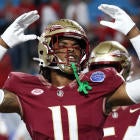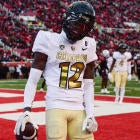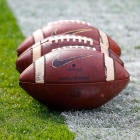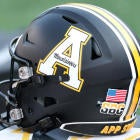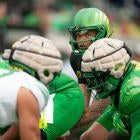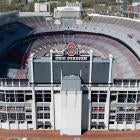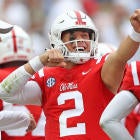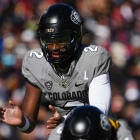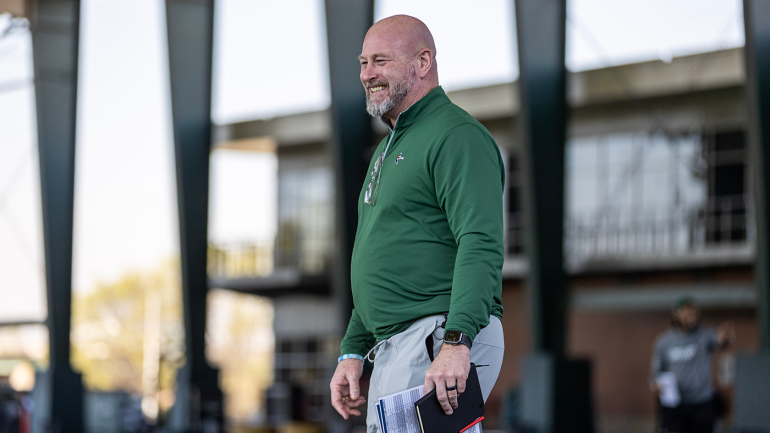
BIRMINGHAM, Ala. -- It was the voice of God that spoke to Trent Dilfer. Never mind that he is UAB's rookie head coach straight out of a high school job. Dilfer knows there is going to be skepticism when he recounts this particular life-turning point.
It might sound trite to some, inspirational to others, but Dilfer swears it's true. The event even has a date: October 2018.
The former Super Bowl champion, NFL analyst and Elite 11 mogul was comfortably retired in his 40s.
"I'm at church one day," Dilfer told CBS Sports, "and I don't want to bang you over the head with the Bible, but I audibly hear the voice of God say, 'Quit saying no to me.' And I am rocked."
Dilfer is staunchly religious; this isn't some off-the-cuff claim. There is an investment there. Heck, he comes to the Blazers having just turned around Lipscomb Academy, a private Christian school in suburban Nashville.
Blazers athletic director Mark Ingram was met with another brand of skepticism -- by his own search committee when seeking to replace Bill Clark. Dilfer is well known, sure, but he's certainly not a traditional hire. He hasn't so much as been a college assistant, and the list of high school coaches who make a successful jump to FBS head coach is shorter than third-and-a-foot.
"You really think I ought to hire a high school coach?" Ingram asked a person who recommended Dilfer during the process.
When the friend agreed and persisted, Ingram relented and agreed to an interview.
"What the hell?" he said. "The guy won a Super Bowl. What's 10 minutes with Trent Dilfer?
"We were on the phone for an hour and a half."
The rest of the story is sitting on a couch in the UAB football coach's office.
Dilfer talks a lot. Dilfer talks a lot about himself. You should know that by now if you have watched him on various platforms over the years. That is not a criticism. As a talking head, better to have someone like Dilfer than a collection of cliches in a polo who doesn't impart any knowledge.
Dilfer tells you everything ... or so it seems.
The Blazers are making the jump from Conference USA to the AAC with their own leap of faith. Ingram is staking the program's future -- along with momentum it has created with a new stadium while entering a new conference -- on first-time college coach. The transition, the recruiting, the appearances in the state and community can be summed up by the program's hashtag: #FireBreathersOnly.
But the voice of God? Five and a half years ago, Dilfer was living "every man's dream." He was retired, playing golf 218 days out of 365 in 2018. Middle daughter Tori summarized her father's condition.
"Dad," Dilfer quoted her as saying, "you've gone a little soft."
A turning point was inevitable, but a divine one?
"Don't trivialize it," Dilfer said. "I'm a deep man of faith. I do believe the Holy Spirit lives within us and communicates with us. … It was like a murmur in my ear on my right shoulder. And my whole body tingled. I was in a little church in Austin [Texas]. I actually stayed after [the service]. I was quiet, saying, 'What just happened to me?'"
Getting Dilfer to open up about any subject is not a challenge. He's a former Super Bowl winner, NFL analyst, ESPN personality and owner of Elite 11. Through all that, he was comfortable enough to retire in his 40s. Now this: a transformation beyond football.
"I just wasn't a very good husband, wasn't a very good father, wasn't a very good friend," Dilfer said. "It was about me. 'I get to do this now!' I sensed it in my wife."
Maybe that was the way it was going to be until a friend called about the job at Lipscomb. Sure, whatever, Dilfer thought.
"I know every high school coach there is," Dilfer told his friend. "Guys ready to be high school head coaches."
No, he was told, the Lipscomb administration wants you. While moving Tori from TCU to Louisville where she had transferred to play volleyball, something changed. The retiree got the fire again.
"'Dad,'" Dilfer remembered his daughter telling him, "'you haven't been doing what you raised us to do.' That was a kick in the balls."
That lesson: hard things equal great things.
"We become our best when we're uncomfortable," Dilfer explained.
Coming out of retirement to do the Lipscomb thing was uncomfortable. A kick? Service oriented? Rejuvenating a community and program? Sure. But the Lipscomb deal was only done after Dilfer ran it past his youngest of his three daughters, Delaney.
You can see why the family is so bonded on decisions like this. They've been touched by lots more than life decisions; they've been touched by tragedy. In 2003, five-year old Trevin -- a son, a brother -- died from heart disease while Dilfer was playing with the Seattle Seahawks.
"Delaney said, 'Dad, whatever you're about to say, the answer is 'yes,''" Dilfer recalled. "I start bawling. She goes out all afternoon and prays for me. She's out there for about four hours."
When Dilfer arrived at Lipscomb, he says there were 36 players, six of whom were lifting with PVC pipes.
"I cried the first time I watched the film," he said, "because they were running out of bounds. … It was broken, broken. … We didn't think we'd get a first down the first year."
Dilfer and his wife Cassandra fundraised. The coach went into his pocket, he says, spending $85,000 on new helmets. Coaches are allowed limited contact with players in the state of Tennessee. A core group took it upon themselves to organize drills in the offseason.
After a 7-6 debut in 2019, Lipscomb went 37-4 over Dilfer's last three seasons.
The guy can coach ... high school ball. What we don't know is what kind of college coach Dilfer will be. To some, he is a household name from his days as an NFL analyst. He is cemented in NFL history for being the quarterback of the 2000 Baltimore Ravens, an offensively challenged team whose defense ravaged the league on the way to a championship. That Super Bowl victory was part of a personal 15-game winning streak as a starting quarterback.
"Why did they call me a game manager? Why did I win 15 straight games in the NFL? I learned how not to lose," Dilfer said.
The man knows his limitations. The No. 6 pick in the 1994 NFL Draft played 14 seasons. He remains the only Super Bowl-winning quarterback to be let go by his team the next season when the Ravens chose not to re-sign him.
"I'm very transparent with my disappointment in my career," Dilfer said. "I had a lot of talent. I turned into a journeyman."
For now, try not to think of him as a high school coach. It is possible Dilfer knows as much about the college game as any newbie moving up from high school. Not that there is much of a sample size. There have been only four such coaches who have made the jump to FBS programs in the last 50 years.
Gerry Faust (Notre Dame, 1981-85) and Tony Sanchez (UNLV, 2015-19) come to mind most prominently. This story isn't that. At least not yet. About halfway through his 13-year NFL career, Dilfer says he started to be more of a coach than a player.
"Then, frankly, I took the easy road," Dilfer said of his post-football career. "TV was easy. There was a lot of money, and it was easy. I had this 12-year gap of ease [before Lipscomb]. But what was interesting in that gap was the relationships and perspectives in football."
As purveyor of Elite 11, the annual competition among the nation's best high school quarterbacks, Dilfer has rubbed elbow pads with the game's best coaches. He was the central figure in the book "The QB: The Making of the Modern Quarterback."
That four-year stay at Lipscomb ended with consecutive state championships and a 21-game winning streak. For 42 of his 51 years, Dilfer has played, coached or talked about football.
There have been coaches who wouldn't be called genius schemers who nevertheless won championships. They knew how to assemble talent. They knew how to motivate a roster. They knew how to hire a coaching staff. Dilfer has forgone $500,000 of his own salary to increase the assistant coaches' pool.
Senior offensive analyst Danny Mitchell estimates he has coached in 21 countries. The 34-year-old comes to UAB from the Vienna Vikings out of Hungary where he was offensive coordinator. Dilfer calls Mitchell "the best offensive mind I've seen in my life."
Former Alabama analyst Alex Mortensen, son of ESPN's Chris Mortensen, is Dilfer's offensive coordinator.
Dilfer says he was pursued by Boise State during its last search. His alma mater, Fresno State, was interested before bringing back Jeff Tedford last year.
"I understand recruiting at its highest level," Dilfer added. "I'm talking about before NIL when guys were making $250,000 [against NCAA rules] and telling me about it, about the offshore gambling accounts that their parents are playing to get $200,000 from [certain] schools, bibles with the carved out in the back [where money was placed]."
In many ways, this is as good as it has been at UAB. Forget Dilfer's inexperience, there is a solid donor base proven by the fact that boosters brought the program back after it had been dropped in 2014. Clark set up everything nicely winning two CUSA titles before a back problem forced the Blazers coach to step down last offseason. The program has been bowl eligible seven straight seasons.
Realignment has been kind as UAB moves into the American beginning July 1. In a couple of years, the College Football Playoff will quadruple in size. Dilfer can look at 2024 recruits and beyond and claim they have a chance to play for a national championship.
"Totally. That's the plan," Ingram said.
"It's not a pipe dream to think you can become the best non-Power Five team out there," Dilfer said. "I like big mountains. I'm not going to make any bones about … where we're going. The term I've been using: This is a powder keg, and I'm [here] to light that fuse."
We told you the guy could talk.















